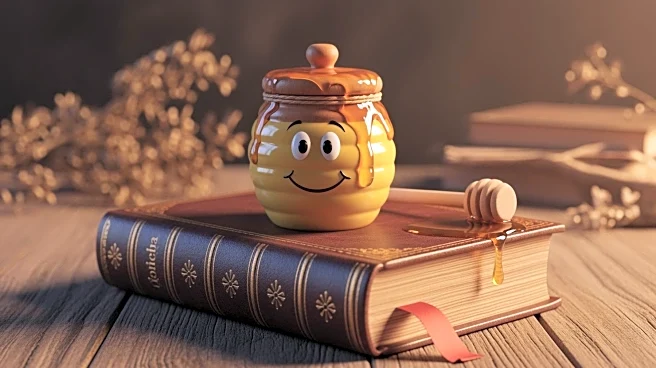What's Happening?
Gyles Brandreth, a biographer, delves into the life and works of A.A. Milne, the creator of Winnie-the-Pooh, as the beloved character approaches its centenary. Brandreth discusses Milne's multifaceted
career, which included being a playwright, novelist, and polemicist, despite being predominantly known for Winnie-the-Pooh. Milne's plays were simultaneously running on Broadway and in London's West End during the 1920s, showcasing his versatility as a writer. Brandreth highlights Milne's complex personality, describing him as both shy and gregarious, and notes his belief that pure happiness is a state reserved for childhood. The enduring appeal of the Pooh stories is attributed to their enchanting settings and relatable characters, which resonate with both children and adults.
Why It's Important?
The exploration of A.A. Milne's life and the centenary of Winnie-the-Pooh underscore the lasting impact of children's literature on cultural and financial landscapes. Milne's work, particularly Winnie-the-Pooh, has become a publishing and financial phenomenon, largely due to its universal themes and Disney's adaptations. This highlights the potential for children's literature to transcend generations, influencing both the literary world and popular culture. The continued success of the Pooh stories demonstrates the power of storytelling in creating timeless characters that offer comfort and joy across ages.
What's Next?
As Winnie-the-Pooh reaches its 100th anniversary, there may be renewed interest in A.A. Milne's broader body of work, potentially leading to re-evaluations of his contributions beyond children's literature. The centenary could also inspire new adaptations or interpretations of the Pooh stories, further cementing their place in cultural history. Publishers and literary scholars might explore Milne's other writings, offering a more comprehensive understanding of his literary legacy.
Beyond the Headlines
The centenary of Winnie-the-Pooh invites reflection on the ethical and cultural implications of literary fame overshadowing an author's broader work. Milne's frustration with being primarily known for Pooh raises questions about the recognition of diverse literary contributions. Additionally, the commercialization of Pooh through Disney adaptations prompts discussions on the balance between artistic integrity and commercial success in literature.










